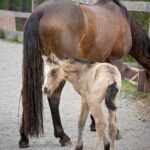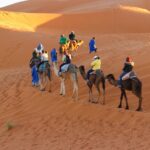Wild horses are magnetic creatures who were once on the brink of extinction but have made a powerful comeback. And, today, we are going to discuss their living conditions and natural habitat.
Horses prefer to live in abandoned or open spaces in the wild that have enough grass for grazing. They have a dusty yet majestic appearance and can be found in California, Arizona, Texas, Nevada, Utah, etc. Since these animals are herbivores, they depend on plants and need enough land to graze.
Staying in the wild comes with risks, but horses adapt themselves to the lifestyle and effectively ward off danger. Now that we have a brief idea about the ecosystem and living patterns of wild horses, let us look at some of the commonly asked questions about them.

What is the average life span of a wild horse?
The lifespan of a horse depends on various factors such as its breed, living conditions, and the availability of the required nutrition.
On average, wild horses live for around 15-16 years. However, given the right circumstances, they can live much longer. Some horse breeds, such as Mustangs, although typically not wild, can live up to 36 to 40 years. Even Corolla horses can live well into their 20s.
If wild horses do not suffer from any health problems and receive proper nourishment, they grow very strong and have a longer lifespan.
How long do horses live in captivity?
Horses who live in captivity have healthier lives as they enjoy access to proper nutrition, rest, and medical care. Let’s explore together how long domesticated horses live.
In captivity, horses can live up to 25 to 30 years if given the right living conditions. Usually, smaller breeds and ponies tend to live longer. If we go by Guinness World Records, the longest living horse in captivity, Old Billy, lived up to 62 years.
Regular movement, sufficient exercise, and proper food (like forage and fiber-pellets) can keep your horse fit.
Why do wild horses live longer?
One of the common myths about wild horses is that they do not live very long. However, that’s far from the truth. Let’s understand why horses live longer in the wild.
Wild horses develop resistance to extreme weather conditions over time and can even become immune. As such, they live longer and can survive in arid or semi-arid regions. Besides, wild horses often travel in a herd (as in the case of Mustangs) and protect each other.
Free from any constraints, wild horses thrive in the wild and enjoy open areas where they can graze freely.
Where do wild horses sleep?
Wild horses face the tremendous danger of predators lurking around in forests and abandoned places. Read on to know more about how wild horses find a suitable sleeping spot.
Wild horses sleep out in the open but do not have any designated place. They can sleep in various locations such as in open fields, under a tree, an abandoned cave, and so on. They are constantly on the lookout for new and empty places, as they consider them to be safer resting spots.
Safety is of utmost importance to wild horses, and this is why they properly inspect the area before sleeping.
Are wild horses alert when they sleep?
Horses are intuitive animals with a keen sense of awareness. But, they are known to have very strange sleeping patterns.
Horses remain alert when they sleep as they are aware of the dangers that exist in the wild. Besides, if they are traveling in groups, they take turns sleeping, and one member of the herd is always awake to keep potential dangers at bay.
In general, horses do not have a fixed sleep schedule and can sleep both standing and sitting.
How many hours of sleep does a horse need?
There are several misconceptions about the sleeping patterns of horses and how many hours of sleep they need. Let’s understand this mystery together.
Horses need 5-7 hours of sleep every day and a minimum of 2 hours of REM sleep to stay healthy and function properly. Horses never sleep for prolonged periods but opt for quick naps throughout the day. Often, they lay down on their sides to get REM sleep.
Horses are not deep sleepers and alternate between sleeping and grazing the land at night.
What kind of food do wild horses eat?
A common misconception about wild horses is that they are not choosy when it comes to food and eat anything found in the wild. Let’s explore if there is any truth to this statement.
Wild horses prefer eating grass, shrubs, and other edible plants. Their diet has high forage and mineral content, which boosts their teeth health and keeps them fit. They find their own food and spend around 15-16 hours per day grazing the land.
Horses do not eat very large meals in one go and opt for multiple feeds during the day.
Are wild horses dangerous?
One of the commonly asked questions is whether wild horses are dangerous to humans around them. Let’s find out the answer together.
As a whole, wild horses are not dangerous unless they feel threatened by you. Since they move around in groups, it is generally advisable not to interfere in their business since they are quite protective of each other.
Horses are friendly creatures and like to interact with other horses. They do not like any interruptions to their routine, so it is best to leave them alone and for more details “Are Horses Dangerous” are here..
What is the general behavior of wild horses?
Wild horses are generally shy creatures but have different survival requirements and behavioral patterns. Let’s check out what they are.
Wild horses are social creatures who get along with their tribe and prefer to move in groups. But, they view any outsider as a potential threat and can get quite aggressive towards them, but that is extremely rare. They prefer fleeing the scene rather than facing the danger head-on.
All said and done, wild horses mind their own business and do not like to be disturbed. If you want to observe them, it is best to maintain a distance.
What impact do wild horses have on the environment?
The population of wild horses has increased over the years, and they live on public land. Let’s understand what impact they collectively have on the environment.
Wild horses can damage land through overgrazing, but their manure benefits the soil and enriches the plants. Besides, they remove dry forage, which often results in fires. Wild horses are also popular tourist attractions, and tourism has tremendous economic benefits.
The population of wild horses continues to increase through the conservation efforts of environmentalists and animal experts. They are beautiful creatures, which maintain the ecological balance in the animal world.
Conclusion
Horses, in general, are among the strongest animals out there, but wild horses are more robust than their domesticated counterparts. They have strong, powerful legs and hard hooves, due to which they can navigate rough terrain with ease.
Besides, since they roam in the wild, they are more adept at surviving harsh weather conditions and predators.




